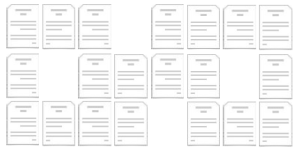 At the time when academic publication was solely print based, authors would receive a packet of reprints from their publisher for distribution to their colleagues. But the world changed with the arrival of the Web, and with the development of the open access model many authors are making online versions of their works available to be freely downloaded by any interested party. Then, as reported in the issue of The Economist which appeared on 11th January, Elsevier began the fightback by invoking the terms of the Digital Millennium Copyright Act¹ (DMCA), an American law which allows copyright holders to demand the removal of anything posted online without their permission.
At the time when academic publication was solely print based, authors would receive a packet of reprints from their publisher for distribution to their colleagues. But the world changed with the arrival of the Web, and with the development of the open access model many authors are making online versions of their works available to be freely downloaded by any interested party. Then, as reported in the issue of The Economist which appeared on 11th January, Elsevier began the fightback by invoking the terms of the Digital Millennium Copyright Act¹ (DMCA), an American law which allows copyright holders to demand the removal of anything posted online without their permission.
The first warning shot was heard when, at the start of December 2013, Elsevier sent around 2,800 e-mails to Academia.edu (a commercial site in direct competition with Elsevier’s Mendeley product) requesting the removal of papers produced by academics from American and Canadian universities from their site. In similar vein, Elsevier began sending similar requests the following week to institutions such as the University of Calgary, California- Irvine, UCDavis University, and Harvard.
Voices were immediately raised in defense of the right of authors to publish their works in open access. The view coming from academia points out that it is usually only the final version of an article, as it appears in the journal concerned, which is protected by the publisher’s copyright. However, it is not the same matter for earlier versions of an article. Elsevier is in agreement with this point of view, and accepts that such earlier versions can be freely distributed if the author wishes.
Elsevier’s action has set off alarm bells in academia, because it is felt that there may be a risk of other journal publishers following the same line of action as that taken by Elsevier, although in the long term, it could have the opposite effect in the form of accelerating the rise of open access publishing initiatives from academic institutions themselves. Up to now there are no reports of the commencement of any law suits, and this is the first time that any publisher has dealt such a severe blow to researchers publishing their own works online, and by taking better account of recent legal provisions made in the USA and the European Community which require that publicly financed research be published in open access after a period of embargo² (optional and variable).
Many publishers allow authors to self-archive articles on their own web sites. This normally occurs after the peer-review process has taken place but prior to the publication of the final version, and in these cases it is often the case that an embargo period may be imposed.
In view of the state of confusion that has been created in the research community over the last few weeks, The University of California Office of Scholarly Communication has published a series of options and suggestions for authors who may receive a takedown notice. The more important of these are highlighted below:
- If a takedown notice has not been received, nothing needs to be done.
- If the article has been deposited in an Institutional Repository, the Repository will need to determine the action to take. It is important that the Repository state its policy on open access.
- If the article has been published in a commercial journal, the author should read the contract that was signed to understand the restrictions and freedoms.
- If the author does not know the policies of the journal in which the article is published, they can be found in the SHERPA/RoMEO³ site’s database of policies where the degrees of freedom are listed in detail (self-archive, Gold Road, Green Road, etc.).
- In the case of institutions covered by the DMCA (and similar laws in other countries), it is suggested that they protect themselves in accordance with the guidelines of Section 512 of the DMCA¹.
Elsevier and other publishers in STM (Science, Medicine and Technology) clearly consider the Open Access movement a threat to their enormous profits, since Elsevier reported profits for 2012 of £780 million, 65% of which came from journal subscriptions to academic institutions. Although the cost of publishing on the Internet has significantly decreased, the costs of journal subscriptions has increased close to 30% in real terms since 1986.
For its part, Elsevier responded in its blog that the practice of issuing takedown notices is done periodically once the final version of the article has been published. The reason for this practice, according to Tom Reller, vice-president of Global Corporate Relations at Elsevier, is to ensure that the final published version is easily and quickly retrievable in the journal itself so as to maximize the usage metrics and the credits given to the author, and to protect the integrity of the scientific record.
Reller also suggests that if an author wishes to publish in open access, it can be done through the official channel that Elsevier provides⁴, and by paying the established fee to cover the costs. Elsevier uses the Gold Road model for a total of more than 70 of its open access journals, and a hybrid model of open access for approximately 1,600 of its journals.
In other words, if you want to publish with Elsevier in open access, you can do it if you publish in their space, otherwise sooner or later you may get a takedown notice.
This new hard-line stance by Elsevier will certainly intensify the debate about the future of academic publishing because, thanks to the Internet, researchers no longer need to follow the traditional model of scholarly publishing as the way to distribute their research to their colleagues. Certainly a growing number of researchers will begin to reflect on whether the traditional legacy system based on print is more of a hinderance than a help to research, and ultimately if companies like Elsevier are in any way necessary.
This is a concept not far removed from that which the SciELO Program has been promoting over the past 15 years.
Notes
¹ DMCA, Digital Millennium Copyright Act.
The DMCA is a US copyright law, approved in 1998 by the US Senate, that implements the 1996 treaties of WIPO (World Intellectual Property Organization). It criminalizes the production and dissemination of technology, devices, and services intended to circumvent measures that control access to copyrighted works. The main innovation of the DMCA in the field of copyright is the exemption of direct and indirect responsibility of providers of Internet services and other intermediaries. The DCMA was limited by the federal Online Copyright Infringement Liability Limitation Act (OCILLA) where Internet providers are protected from subsidiary liability in what is called “safe harbor” which holds Internet intermediaries harmless against copyright infringement under certain rules explained in Section 512 of the DCMA, known as “DCMA 512.” This extension was adopted by the European Union in its Directive on Electronic Commerce 2000. The Directive on Copyright 2001 implemented the 1996 WIPO Copyright Treaty in the EU.
Sources: http://en.wikipedia.org/wiki/DMCA; http://en.wikipedia.org/wiki/DMCA_takedown
2 SPINAK, E. Os artigos em acesso aberto chegaram para ficar: em menos de 10 anos aproximam de 50% do nível mundial. SciELO em Perspectiva. 2013, Agosto 28. Available from: <http://blog.scielo.org/blog/2013/08/28/os-artigos-em-acesso-aberto-chegaram-para-ficar-em-menos-de-10-anos-aproximam-de-50-do-nivel-mundial/>.
³ SHERPA/RoMEO database of journal policies – http://www.sherpa.ac.uk/romeo/
⁴ Elsevier/ open-access – http://www.elsevier.com/about/open-access
References
Academic publishing: No peeking…A publishing giant goes after the authors of its journals’ papers. The Economist. 2014, January 11. Available from: <http://www.economist.com/news/science-and-technology/21593408-publishing-giant-goes-after-authors-its-journals-papers-no-peeking>.
BAILEY, J. The Intersection of Copyright and Research. Ithenticate. 2014, January 14. Available from: <http://www.ithenticate.com/plagiarism-detection-blog/intersection-of-copyright-and-research?utm_campaign=blog-alerts&utm_source=hs_email&utm_medium=email&utm_content=11642820&_hsenc=p2ANqtz-8QbQ5-LV9MXOPsxU8OriJCluZ6r_824RPLTd4e_kDGN7N84FF87DdajfNN7LAFsngGNkHBtsxaCCZ6pPpnl_pSLBg3yg&_hsmi=11642820>.
Have You Received an Elsevier Takedown Notice?. UCDavis University Library. 2014, January 9. Available from: <http://blogs.lib.ucdavis.edu/schcomm/2014/01/09/have-you-received-an-elsevier-takedown-notice/>.
HOWARD, J. Posting your latest article? You might have to take it down. Chronicle of Higher Education. 2013, December 6. Available from: <http://chronicle.com/blogs/wiredcampus/posting-your-latest-article-you-might-have-to-take-it-down/48865>.
PETERSON, A. How one publisher is stopping academics from sharing their research. The Washington Post. 2013, December 19. Available from: <http://www.washingtonpost.com/blogs/the-switch/wp/2013/12/19/how-one-publisher-is-stopping-academics-from-sharing-their-research/>.
RELLER, T. A comment on takedown notices (with update). ElsevierConnect [blog]. 2013, December 6. Available from: <http://www.elsevier.com/connect/a-comment-on-takedown-notices>.
The UC Office of Scholarly Communication website summarizes the issues and options should you receive a takedown request from Elsevier. Office of Scholarly Communication. University of California. Available from: <http://osc.universityofcalifornia.edu/2013/12/elsevier-takedown-notices/>.
 About Ernesto Spinak
About Ernesto Spinak
Collaborator on the SciELO program, a Systems Engineer with a Bachelor’s degree in Library Science, and a Diploma of Advanced Studies from the Universitat Oberta de Catalunya (Barcelona, Spain) and a Master’s in “Sociedad de la Información” (Information Society) from the same university. Currently has a consulting company that provides services in information projects to 14 government institutions and universities in Uruguay.
Translated from the original in Spanish by Nicholas Cop Consulting.
Como citar este post [ISO 690/2010]:






![Large Language Publishing [Originally published in the Upstream blog in January/2024] Superimposed photograph of several books with the pages folded into an airplane shape on an infinite black background.](https://blog.scielo.org/en/wp-content/uploads/sites/2/2024/01/pexels-viktor-talashuk-2377295_thumb.jpg)









Recent Comments